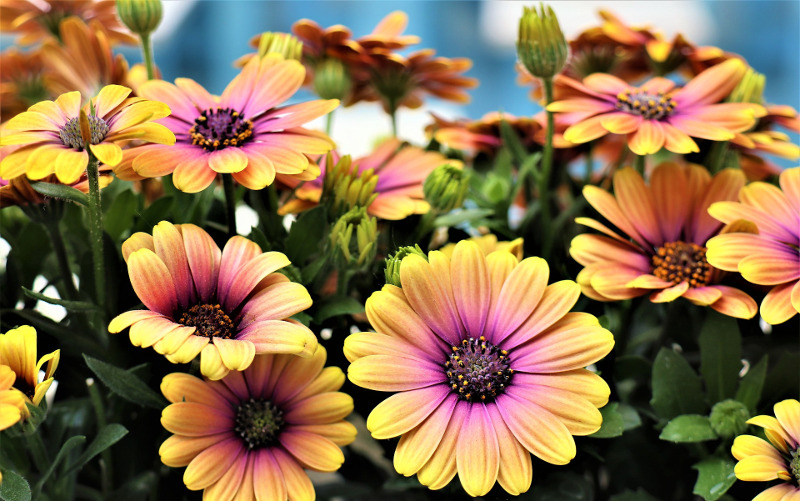African daisies (Osteospermum spp.) look a lot like common daisies, with petals radiating around a center disk. They are even members of the Asteraceae family, along with Shasta daisies and zinnias.
But, their vivid coloring is not at all like the classic daisy. African daisies come in a variety of stunning shades including white, cream, pink, yellow, purple, and blue.
These flowers are best planted in the spring after the threat of frost has passed, usually at around 25 degrees Fahrenheit. While African daisies can survive a surprise frost, they cannot tolerate repeated frosts.
African daisies have a fairly quick growth rate, blooming about two months after sprouting from seeds. Reliably hardy in zones 10 to 11, these tender perennials are planted as annuals in other climate zones. On average, African daises live 2 to 3 years as perennials.
As a Feng Shui enthusiast and avid gardener I’m always seeking ways to harmonize the energy flow in my living and work spaces. One of my favorite techniques is incorporating vibrant positive plants like the African daisy. With its cheerful colors and hardy nature, this flower is ideal for enhancing any area with its auspicious energy. But where exactly should you place African daisies for optimal Feng Shui? After much research and experimentation, I’m here to share the very best placements for these special flowers.
Before jumping into African daisy placement, let’s review some key principles of Feng Shui. This ancient Chinese practice aims to create balance and positive energy flow through strategic interior design. The goal is to promote health, peaceful relationships, and prosperity. Proper placement of objects, furniture and decor is vital. Feng Shui associates different areas of a space with aspects of life. Plants like the African daisy can enhance these areas through their vibrant chi or energy.
African Daisy Attributes
With their bright, bold colors and hardy growth habit, African daisies possess strong yang energy Their cheerful appearance uplifts any space These compact, mounding plants bloom abundantly when cared for properly. African daisies thrive in full sun and require moderate water. With strategic placement, they will imbue your living or work areas with vitality.
Recommended African Daisy Placements for Optimal Feng Shui
Near the Front Door
Placing African daisies near your entryway welcomes positive chi into your home or office Their vibrant energy activates this area connected with opportunities and self-actualization Position an African daisy arrangement on a table or plant stand close to your door,
In the Living Room
As the heart of a home, the living room promotes family and social harmony. African daisies stimulate this with their bright blooms and strong yang essence. Place a potted plant on an end table or bookshelf. Position it in a central area where its energy can radiate outward.
Home Office Spaces
African daisies energize home offices with their lively color and form. Their vibrant chi sparks creativity and focus. Situate an African daisy on your workspace as an uplifting companion through long work hours. Let it lend its energy to your projects and ideas.
Bedroom Retreats
Create a sense of tranquility and intimacy in bedrooms with African daisies. Their softly colored blossoms project gentle energy perfect for this private sanctuary. Place a plant on a bedside table to enhance relaxation and personal relationships.
Outdoor Living Areas
Outdoor spaces allow you to connect with nature’s balance and energy flow. Place potted African daisies on patios, decks and porches to inject these areas with vitality and beauty. Position them where you can enjoy their bright blossoms and positive essence.
Through mindful African daisy placement, you can infuse your important living and working areas with uplifting chi. Follow Feng Shui recommendations to find their optimal spot. With proper care and positioning, these special flowers will promote harmony and prosperity within your personal spaces.

Temperature and Humidity
African daisies prefer mild weather, which is when they bloom most profusely. They can handle nighttime temperatures down to about 40°F, though frost will damage or kill them. Humidity typically isnt an issue for them, as long as they have good air circulation, proper watering, and soil drainage.
Common Problems With African Daisies
African daisies are largely trouble-free plants, but in addition to typical insect and disease issues, a couple of other common problems may occur:
Feng Shui & Flowers: 9 Flowers to Activate the Energy in Your Home
FAQ
What does the daisy flower mean in Feng Shui?
What does the African daisy symbolize?
How much sun does an African daisy need?
How to use feng shui flowers in a living room?
The colors and position placement of the artificial flowers may have an effect. Flowers are seasonal, so opt for paintings or floral prints to incorporate feng shui flowers in the living room when the season doesn’t call for it. Placement is very important in Feng Shui. In fact, it is the most important component.
What feng shui plants attract romance?
Peonies: “The most popular flower to attract romance,” according to feng shui expert Marianne Gordon. Jasmine: Popular for its rich scent, jasmine is often associated with love, beauty, and sensuality. African violets: Along with other plants with round, coin-like leaves, these are thought to be symbolic of money and wealth.
What plants are good for feng shui?
And other research has shown plants can boost productivity and learning. The best plants for feng shui. Philodendron: These have soft, heart-shaped leaves that grow quickly. Cho notes they are great for cultivating relationships. Peonies: “The most popular flower to attract romance,” according to feng shui expert Marianne Gordon.
Can fake plants be used in feng shui?
Fake plants are also not typically considered desirable in feng shui but can be used in a space where they’re the only option, such as a vacation home or in a room with no natural light. 3. Similar to fake plants, dead or dying plants aren’t ideal!
